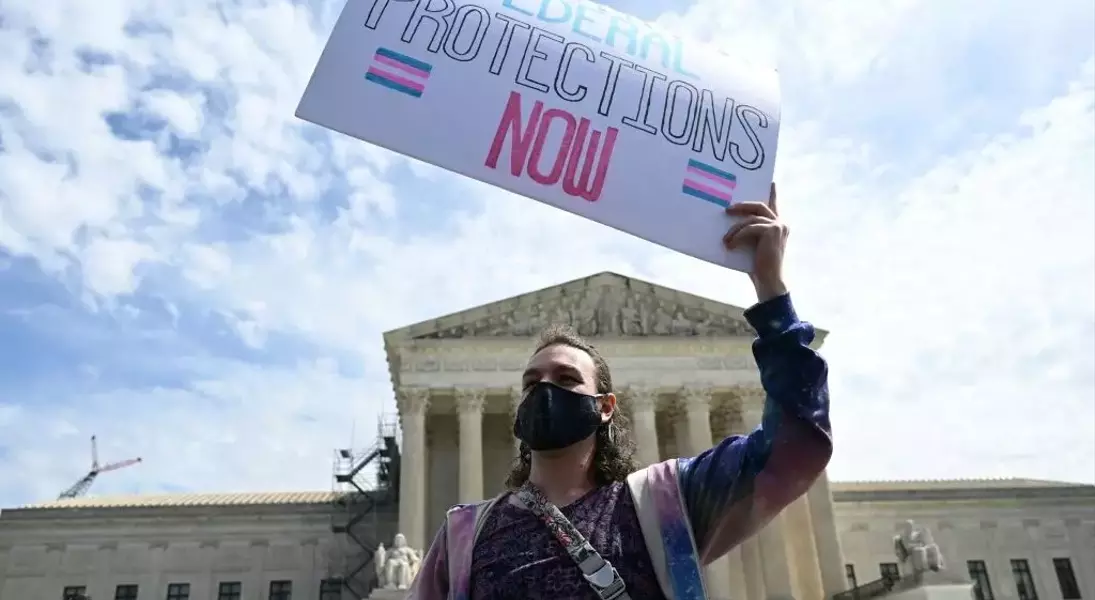In a significant legal development, the Supreme Court is set to hear oral arguments in the case of U.S. v. Skrmetti on December 4. This case holds great importance as it challenges Tennessee's ban on healthcare for trans youth. The courtroom will witness a historic moment as it is the first of its kind to be heard by the nation's highest court, potentially setting a crucial precedent for future trans rights cases.
The Supreme Court's Decision in U.S. v. Skrmetti: A Turning Point for Trans Rights
Background and Context
An activist holds a sign calling for federal protections of transgender rights in front of the U.S. Supreme Court on April 1, 2023. This event serves as a backdrop to the upcoming case. 2024 marks a unique year as it is the first time in several years that the Supreme Court will not hear a significant case directly related to abortion rights. However, the question of bodily autonomy remains on the docket.The plaintiffs in U.S. v. Skrmetti are Samantha and Brian Williams, of Nashville, along with their 15-year-old trans daughter L.W. and two other anonymous families. Represented by various legal organizations, they have filed suit against the state of Tennessee and its attorney general Jonathan Skrmetti to block the ban. Chase Strangio, the co-director for transgender justice with the ACLU's LGBT & HIV Project, will be representing the clients.L.W. expressed her feelings, saying, "I don't even want to think about having to go back to the dark place I was in before I was able to come out and access the care that my doctors have prescribed for me. I want this law to be struck down so that I can continue to receive the care I need, in conversation with my parents and my doctors, and have the freedom to live my life and do the things I enjoy."The Tennessee law in question took effect last summer after an appeals court denied the plaintiffs' request for an injunction. The plaintiffs argue that the ban violates the U.S. Constitution's Equal Protection Clause, similar to the argument made in 2020's Bostock v. Clayton County.Legal Implications and Precedents
Legal experts have drawn parallels between Skrmetti and Dobbs v. Jackson, which overturned Roe v. Wade in 2022. Both cases involve prohibitions on medical treatments vital to a subset of the population. Conservative attorneys are arguing that the Constitution's protections do not apply, and in both cases, conservatives are using the regulation of a medical procedure to target a particular group and circumscribe their autonomy.Since 2021, 24 states have passed laws banning gender-affirming care for trans youth. However, every major medical organization in the U.S. and leading world health authorities support and consider gender-affirming health care for trans youth to be the best practice.Lambda Legal chief legal officer Jennifer C. Pizer stated, "The stakes could not be higher for our communities as the Supreme Court prepares to hear oral argument in U.S. v. Skrmetti and L.W. v. Skrmetti. As hostile state leaders prepare to double-down on their cruel, unprecedented and discriminatory attacks on transgender youth, the Court has the opportunity and duty to apply the law fairly, which means returning medical decisions to where they rightfully belong: to parents, their children and their doctors."This case is not only about the fate of a specific ban but also about the broader issue of transgender rights and the role of the Supreme Court in safeguarding them. It has the potential to shape the legal landscape for years to come and ensure that transgender individuals have access to the healthcare they need.You May Like

